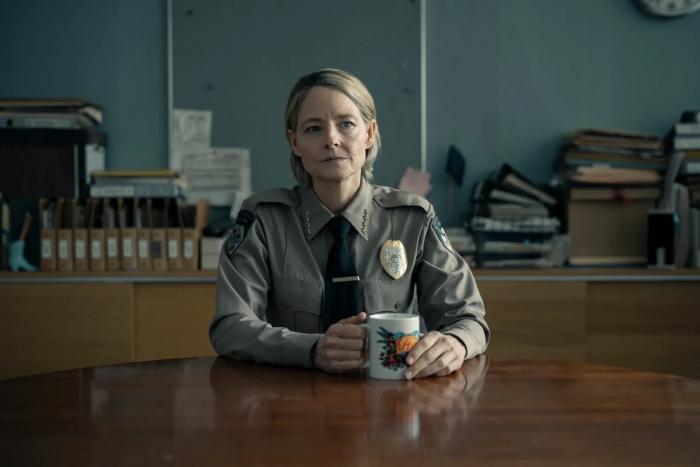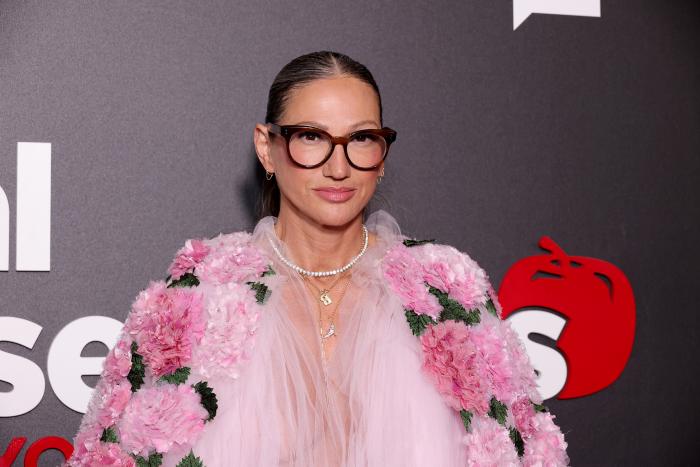

'True Detective: Night Country': Eat Your Dreams Inside Out, Pizzolatto
By Dustin Rowles | TV | February 19, 2024 |
By Dustin Rowles | TV | February 19, 2024 |

Seven or eight months ago, I quit Twitter. After 10/7, Threads also lost what little value it had for journalists, so I began using an RSS feed and Reddit to do my job. For the most part, it’s been revelatory: The rewiring Twitter had done to my brain slowly began to reverse itself, and I started to think like a human being again instead of a knee-jerk reactionary. The amount of toxicity I was subject to dropped maybe 95 percent.
In recent weeks, however, there’s a place where that level of toxicity can still be found outside of Twitter: The True Detective subreddit. That subreddit seemed to approach the season cautiously but mostly bought into the first episode and even seemed to appreciate some of the callbacks to the first season. Once it became clear, however, that True Detective’s original creator Nic Pizzolatto didn’t care for the season or appreciate the callbacks, the subreddit went south.
As the Internet is so fond of doing, it became a binary choice for the subreddit between those who liked Pizzolatto’s True Detective and those who liked Issa López’s Night Country. An undercurrent of sexism and grievance politics played a role, and the subreddit quickly turned into “Here’s everything we hate about Night Country.” It’s petty and exhausting, but most of all: It’s wrong.
Issa López crushed this season of True Detective, and I say that as someone who thought the first season of TD (or at least the first seven episodes) was one of the best seasons of TV of the last decade. Night Country is better, mainly because López did what Pizzolatto could not: She nailed the finale. I was angry about Pizolatto’s finale because I and nearly every other online theorist had thought of a better ending than his. I love López’s because her ending was far better than any that our theories suggested, and thank God for that.
Were there supernatural elements at play this season, as so many had feared? Sure, but not really. Grief, trauma, and darkness wreaked havoc on the characters, and that havoc often manifested itself in hallucinations or depression. Ultimately, it didn’t play directly into the mystery’s resolution. The solution was hidden in plain sight, or exactly where López knew the toxic fanboys (and, to be honest, the rest of us) would never look: The Native women. The cleaning ladies.
It was a brilliant solution but also a perfect commentary on the way that Native women are so often ignored or forgotten. López used society’s blind spot against the audience, and it’s not just that we eliminated them as a suspect. It’s that we never even considered them. I did not see a single theory correctly guess the outcome, and yet it made perfect sense: The Iñupiat women did it.
The short version is this: the TSALAL scientists were on the brink of finally being able to remove life-changing microorganisms from the permafrost because pollution from the Silver Springs mine was melting the underground ice. To speed up the process, the TSALAL scientists encouraged more pollution from the mines. They fudged the numbers to help generate additional pollution, which also led to illness, unclean water, stillbirths, and disruption of the wildlife (which explains the caribou in the season’s cold open).
Annie K., through her romantic relationship with Raymond Clark, figured all of this out six years prior and eventually found a lab in the ice caves where they were working to extract the microorganisms. She was so angry about her discovery that she began destroying the lab, as well as two years of work the scientists put into it. The scientists retaliated by killing her. Raymond Clark played a role.
It was the Native cleaning lady who discovered their underground cave years later and put the pieces together. To avenge Annie’s murder, the Iñupiat women abducted the scientists, drove them out into the tundra, made them strip naked and run out into the snow where they froze to death. They even folded the clothes they left behind because they work as cleaning ladies and they couldn’t help themselves (clever!). Only Raymond managed to escape by hiding in the underground lab and holding the hatch closed to prevent them from capturing him. As for the bite marks and scratched corneas: Hypothermia may explain it. Either that, or the naked scientists were so cold that they tried to hasten their own deaths.
That’s the solution in a nutshell: The scientists killed Annie. The Iñupiat women killed the scientists. Navarro and Danvers, however, were content to overlook the murder of the scientists and chalk it up to what Kate McKitrick and Captain Donnelly had already insisted was a slab avalanche. After Navarro and Danvers caught Raymond Clark, Navarro allowed him to end his life (by freezing to death) in exchange for a full confession.
There was some other stuff, too. Pete buried his father’s body in the ocean beneath the ice and reconciled with Kayla. Navarro learned her Native name: Siqinnaatchiaq, which means, appropriately, the return of the sun after a long darkness. Danvers gained closure with her son’s death while also reconciling with Leah. There were also a few more callbacks to Pizzolatto’s first season: The two detectives interviewing Danvers, “time is a flat circle,” and the Carcosa symbols, but ultimately, the callbacks meant little. I think López used them both to pay homage to Pizzolatto’s very good first season but also as fun red herrings. (I’m not sure that Pizzolatto understands the meaning of “fun.”)
There were still a couple of questions that remained unanswered, intentionally so. Who left Annie’s tongue in the TSALAL station? Maybe Hank. Maybe the Native women. Maybe someone else. And did Navarro walk out into the ocean in the end and die? Is that her ghost that Danvers and Leah visited in a cabin, or did Navarro skip town and now meets Danvers and Leah periodically in a cabin to catch up on old times? The latter seems obvious to me, but others feel strongly that it’s the former. Either interpretation works.
López delivered a strong enough season that she gets vagueness leeway, although you can bet the bros complaining about those open questions would’ve also pitched a fit if López had tied up the ending too nicely. It’s impossible to please everyone — especially toxic male fandoms. All showrunners can do is deliver the best season possible and let the results speak for themselves, and Night Country is an immensely impressive season of television from the first episode to the last.
← Cillian Murphy, Oppenheimer, Emma Stone, Zone of Interest: 2024 BAFTA Winners | John Oliver Thinks His Emmy's Are a 'Suit Of Armor' for 'Last Week Tonight' →
More Like This
Charming Ramy Youssef Mines the Comedy of NPR's Tiny Desk Concerts as Host of 'SNL'
Spoilers: Netflix’s Korean Comedy 'Chicken Nugget' Is Getting Review-Bombed Over A Single Joke
How 'The Regime' and 'Palm Royale' Complicate Their Genres
Jenna Lyons Has Conditions For ‘Real Housewives’ Return
This Week On ‘Selling Sunset’: Irreconcilable Differences

Jenna Lyons Has Conditions For ‘Real Housewives’ Return
This Week On ‘Selling Sunset’: Irreconcilable Differences
Huey Lewis Was Inspired By 'Mamma Mia' For His Next 'Career Event'
Paramount+ Is Getting Cues From David Zaslav
Yorgos Lanthimos Reteams with Emma and Viggo Goes West In Three Trailers
Kristen Stewart Will Never Make an ‘Algorithmic’ Marvel Movie
More Like This
Charming Ramy Youssef Mines the Comedy of NPR's Tiny Desk Concerts as Host of 'SNL'
Spoilers: Netflix’s Korean Comedy 'Chicken Nugget' Is Getting Review-Bombed Over A Single Joke
How 'The Regime' and 'Palm Royale' Complicate Their Genres
Jenna Lyons Has Conditions For ‘Real Housewives’ Return
This Week On ‘Selling Sunset’: Irreconcilable Differences
Reviews